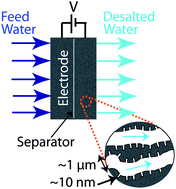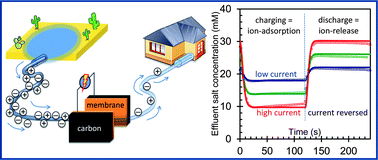Desalination is currently a very topical area of research; with the world’s ever increasing population and demand for fresh drinking water. As a result, research in this area is moving fast, with new technologies being developed all the time.

The first paper demonstrates an alternative architecture to traditional CD cells, where the feed flows directly through the electrodes along the direction of the primary electric field (flow-through electrode (FTE) capacitive desalination). This novel set-up has resulted in a significant reduction in desalination time and improved salt concentration reductions; with a mean sorption rate of nearly 1 mg NaCl per g aerogel per min, that’s up to 10 times higher than that demonstrated by the typical CD cell:
Capacitive desalination with flow-through electrodes
Matthew E. Suss , Theodore F. Baumann , William L. Bourcier , Christopher M. Spadaccini , Klint A. Rose , Juan G. Santiago and Michael Stadermann
Energy Environ. Sci., 2012, DOI: 10.1039/C2EE21498A
The second paper discusses membrane capacitive deionization (MCDI), which is based on applying a cell voltage between two oppositely placed porous electrodes, with a spacer channel that transports the water to be desalinated. Current MCDI devices operate at a constant cell voltage, resulting in an effluent stream of desalinated water of which the salt concentration varies with time. In this paper, van der Wal and colleagues propose a different operational mode for MCDI, whereby desalination is driven by a constant electrical current, which leads to a constant salt concentration in the desalinated stream over long periods of time. This is shown to significantly reduce energy consumption, which would be essential for the economic viability of membrane-based desalination techniques:
Energy consumption and constant current operation in membrane capacitive deionization
R. Zhao , P. M. Biesheuvel and A. van der Wal
Energy Environ. Sci., 2012, DOI: 10.1039/C2EE21737F
You can read more about desalination in the recent Chemistry World article: Keeping the tap on and other related articles.











